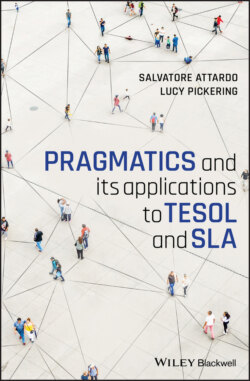Читать книгу Pragmatics and its Applications to TESOL and SLA - Salvatore Attardo - Страница 19
Grammaticalization and Pragmatics
ОглавлениеSome authors have tried to distinguish between a linguistic pragmatics and a general pragmatics. The idea is that some pragmatic processes are needed to process linguistic components, for example, in the use of T/V pronouns6 in the Romance languages. If a student chooses to address a professor by the T pronoun, it is the equivalent of addressing him/her by their first name (Lucy), rather than by their title and last name (e.g., Dr. Pickering). The choice is eminently pragmatic (How familiar/informal does the student want to be? How much respect and distance does he/she want to show?) and it is encoded directly in the grammar of the language (i.e., grammaticalized).
Other pragmatic phenomena are essentially not linguistic in nature: if one is asked if Mary and Bob are having an affair, and one smiles knowingly, a pragmatic inference can be drawn that it is the case that Bob and Mary are having an affair, that the speaker knows this, and that to some extent they are not that bothered by it. None of these inferential processes is (directly) linguistic.
Another distinction that can be drawn is between grammar and pragmatics. Since grammar is a code, many scholars (e.g., Ariel, 2008) propose to use that as the boundary: in a rough form, the distinction is illustrated in Table 1.1.
Table 1.1 The grammar/pragmatics boundary, according to Ariel, 2008.
| Grammar | Code | Conventional |
| Pragmatics | Inferences (nonlogical) | Not based on convention |
The obvious problem is that pragmatics and grammar are in a dynamic relation: what used to be pragmatic inferences become part of the set of conventions of the language and eventually become grammaticalized (i.e., it becomes part of the grammatical system). Consider an example:
(4) Can you pass the salt?
Literally this means “are you capable of passing the salt?” but most speakers of English are surprised by this because the expression has become conventional for “please pass the salt.” When a convention becomes so engrained that speakers are no longer aware of its origin, as well as usually phonetically reduced (i.e., loses some of its sounds), it becomes grammaticalized. For example, Old English “willan” (to intend) became “will” (as in “I will go”) indicating intention, and eventually it was reduced to “I’ll go” indicating future tense. We will return to the topic of the semantics/pragmatics boundary in Section 4.1.7.
It is possible that the reason it is so hard to find a watertight boundary between semantics and pragmatics is that one just does not exist and that there is a continuum of meaning, some more conventional, some less, some grammaticalized, and some not. Ultimately, from the point of view of teaching, the lack of a clear boundary between semantics and pragmatics may be moot: meaning, whether it is semantic or pragmatic, is meaning, and speakers convey it, regardless of the definitions.
However, it is important to understand these distinctions in order to be able to read the literature in the field: what are we to make of the insistence or perhaps obsession in the field with finding a boundary, especially in relation to the idea of modularity? Historically, the idea of modularity was imported from psychology. Likewise, the idea of proposition and the whole idea of truth-functional semantics was imported wholesale from philosophy. The idea that utterances express a proposition that is then “modified” underlies speech act theory, the cooperative principle, politeness theory, and the entire fields of stance and metapragmatics, to use one example. These ideas are now so entrenched into pragmatics that it is impossible to even talk intelligently about the subject without assuming knowledge of these subjects.
Moreover, increasingly pragmatics is moving toward a more experimental paradigm, in which researchers perform psycholinguistic experiments and draw conclusions from them about the nature of pragmatics. In those types of experiments, which usually involve reaction times or the tracking of the gaze of the subjects as a proxy of their attention, whether semantics is modular is a crucial question, because reaction times will vary depending on that (so far the evidence points to the fact that lexical processing happens in a non-modular fashion).
